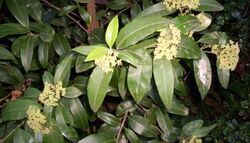Biology:Backhousia
| Backhousia | |
|---|---|

| |
| Backhousia citriodora foliage and flowers | |
| Scientific classification | |
| Kingdom: | Plantae |
| Clade: | Tracheophytes |
| Clade: | Angiosperms |
| Clade: | Eudicots |
| Clade: | Rosids |
| Order: | Myrtales |
| Family: | Myrtaceae |
| Subfamily: | Myrtoideae |
| Tribe: | Backhousieae |
| Genus: | Backhousia Hook. & Harv.[1][2] |
| Synonyms | |
| |
Backhousia is a genus of thirteen currently known species of flowering plants in the family Myrtaceae.[1][2] All the currently known species are endemic to Australia in the rainforests and seasonally dry forests of Queensland, New South Wales and Western Australia.[2][3]
In 1845 in the European science publication the Botanical Magazine William Jackson Hooker and William Henry Harvey first published this genus's formal description and name, after botanist James Backhouse from England and Australia.[1][2]
They grow to aromatic shrubs or trees from 5 to 25 m (20 to 80 ft) tall, with leaves 3–12 cm (1.2–4.7 in) long and 1–6 cm (0.4–2.4 in) wide, arranged opposite to each other.
Species
Sourced from the authoritative Australian Plant Name Index and Australian Plant Census (As of June 2014).[2] For taxa including undescribed species further afield outside Australia, for example likely in New Guinea, this list lacks them—refer also to the genus Kania.[2][3]
- Backhousia angustifolia F.Muell., curry myrtle, narrow leaf myrtle
- Backhousia bancroftii F.M.Bailey, Johnstone River hardwood
- Backhousia citriodora F.Muell., lemon scented myrtle, sweet verbena tree, lemon scented verbena, lemon ironwood
- Backhousia enata A.J.Ford, Craven & J.Holmes[4]
- Backhousia gundarara M.D.Barrett, Craven & R.L.Barrett; formerly Backhousia sp. Prince Regent (W.O'Sullivan & D.Dureau WODD 42) WA Herbarium [5]
- Backhousia hughesii C.T.White, stony backhousia, stonewood, lime wood, grey teak
- Backhousia kingii Guymer
- Backhousia leptopetala (F.Muell.) M.G.Harr., former name: Choricarpia leptopetala (F.Muell.) Domin, brush turpentine, brown myrtle[5]
- Backhousia myrtifolia Hook. & Harv., grey myrtle, carrol, ironwood, neverbreak, iron myrtle, cinnamon myrtle
- Backhousia oligantha A.R.Bean[6]
- Backhousia sciadophora F.Muell., shatterwood, ironwood, boomerang tree
- Backhousia subargentea (C.T.White) M.G.Harr., former name: Choricarpia subargentea (C.T.White) L.A.S.Johnson, giant ironwood, scrub ironwood, lancewood, ironwood box[5]
- Backhousia tetraptera Jackes[5][7]
- Formerly included here
- Backhousia anisata was transferred to Anetholea anisata,[8] and later to Syzygium anisatum.[9]
References
- ↑ 1.0 1.1 1.2 Hooker, William Jackson; Harvey, William Henry (1845). "Tab. 4133 Backhousia myrtifolia Myrtle-leaved Backhousia; Nat Ord. Myrtaceae—Icosandria Monogynia; Backhousia. Hook. et Harv." (Digitised archive copy, online, from biodiversitylibrary.org). Botanical Magazine 71: tab: 4133 (plate and text formal genus and species description). https://www.biodiversitylibrary.org/page/434290. Retrieved 12 Oct 2014.
- ↑ 2.0 2.1 2.2 2.3 2.4 2.5 "Backhousia%". Australian Plant Name Index (APNI), Integrated Botanical Information System (IBIS) database. Centre for Plant Biodiversity Research, Australian Government. http://www.anbg.gov.au/cgi-bin/apni?TAXON_NAME=Backhousia%25. Retrieved 26 Apr 2013.
- ↑ 3.0 3.1 Kew World Checklist of Selected Plant Families
- ↑ Ford, Andrew J.; Craven, Lyndley A.; Brophy, J. J. (2005). "Backhousia enata A.J.Ford, Craven & J.Holmes (Myrtaceae), a new species from north-eastern Queensland". Austrobaileya 7 (1): pages 121–127, fig. 1, map 1.
- ↑ 5.0 5.1 5.2 5.3 Harrington, Mark G.; Jackes, Betsy R.; Barrett, M. D. et al. (2012). "Phylogenetic revision of Backhousieae (Myrtaceae): Neogene divergence, a revised circumscription of Backhousia and two new species". Australian Systematic Botany 25 (6): 409–414. doi:10.1071/sb12015. https://researchonline.jcu.edu.au/24411/1/Phylogenetic_revision_of_Backhousieae_%28Myrtaceae%29.pdf.
- ↑ Bean, A. R. (2003). "Backhousia oligantha (Myrtaceae), a new species from Queensland". Austrobaileya 6 (3): pages 533–536, fig. 1, map 1.
- ↑ "Mystery Tree April 2010; Update 2012 Backhousia tetraptera" (website). The Society for Growing Australian Plants Townsville Branch Inc.. 2012. http://www.sgaptownsville.org.au/Mystery-Tree.html. Retrieved 16 May 2013.
- ↑ Wilson, Paul G.; O'Brien, M. M.; Quinn, Chris J. (2000). "Anetholea (Myrtaceae), a new genus for Backhousia anisata: a cryptic member of the Acmena alliance". Australian Systematic Botany 13 (3): 429–435. doi:10.1071/SB99008.
- ↑ Craven, Lyndley A.; Biffin, Ed (2005). "Anetholea anisata transferred to, and two new Australian taxa of, Syzygium (Myrtaceae)". Blumea 50 (1): 157–162. doi:10.3767/000651905x623346. http://www.repository.naturalis.nl/document/565495.
Wikidata ☰ Q2471221 entry
 |

